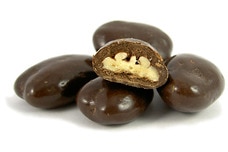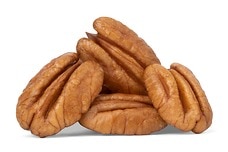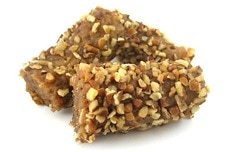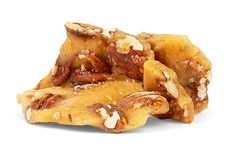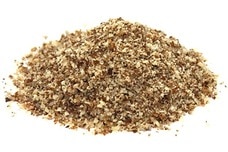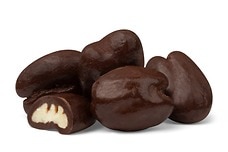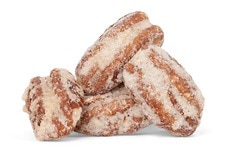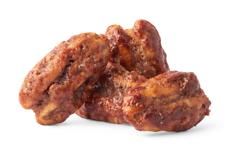Benefits of Pecans
Many Americans are most familiar with pecans as they take center stage on the holiday table in the form of pecan pie. However, these delicious nuts deserve to be enjoyed throughout the year. Outside of their pie form, which tends to be laden with sugar and fat, pecans are a healthy nut that makes an easy snack or can add heft to a meal.
Pecan Snacks & More
Pecan trees are large, deciduous trees that are related to hickory trees. Easily identifiable by its rich brown kernel with a distinctive grooved surface, pecans have a distinct flavor from other tree nuts. Some people describe the pecan as nearly buttery in flavor (Hudson Pecan, n.d.). It is possible to purchase pecans in a variety of sizes, from “midget” to “mammoth.” This makes them an incredibly versatile food. Consider some of the following benefits of pecans when deciding to add them to your diet.
Pecans Have the Highest Fat Content of Any Nut -- And It’s the Good Kind of Fat!
More than 70% of pecans is made up of fat (Hudson Pecan, n.d.). Before you steer clear of the nuts, rest assured: it’s the good kind of fat. Scientists have found that only certain types of fat are unhealthy to include in your diet. For example, saturated and trans fats are associated with higher levels of cholesterol and greater risk of cardiovascular disease (Harvard T.H. Chan School of Public Health, 2016). Minimizing your consumption of these fats, preferably to below 10% of your daily calories, is important.
In contrast, pecans are full of healthy monounsaturated fats and contain very few saturated fats (Hudson Pecan, n.d.). They are a particularly good source of oleic acid, a monounsaturated fatty acid that has been shown to improve immune system functioning, reduce inflammation, and potentially reduce your risk of cardiovascular disease (Sales-Campos et al., 2013).
Pecans Contain Vitamin E, Which Has Antioxidant Effects and May Boost Immune Activity
Pecans are one of the best known dietary sources of vitamin E, which has antioxidant effects. Vitamin E actually comes in eight isoforms, with alpha-tocopherol being the preferred form of the vitamin used by the human body (Traber, 2015). There are 0.4 mg of alpha-tocopherol in a one-ounce serving of pecans, helping you get to your recommended daily allowance of 15 mg of alpha-tocopherol with every serving. Pecans also contain 6.9 mg of the vitamin E isoform gamma-tocopherol (Traber, 2015). This compound scavenges free radicals and reactive nitrogen species that can cause cellular damage. Getting enough vitamin E is associated with reduced risk of age-related macular degeneration, fatty liver diseases, cataracts, type 2 diabetes, and even certain types of cancer (Traber, 2015).
Pecans Are a Plant-Based Source of Protein
Because of their rich and naturally sweet flavor, some people mistakenly categorize pecans as an exclusively dessert food. This is a huge mistake, causing you to miss out on pecans as a great source of nutrition in savory items. For example, if you’re craving a salty snack, toss pecans with garlic powder, dried mustard, and a sprinkle of sea salt before throwing them into the oven to roast.
Pecans are rich in protein, adding bulk to your meals that will prevent you from getting hungry shortly after eating. For instance, one ounce of pecans contains 3 grams of protein (Self Nutrition Data, 2015). Try adding a handful pecans to a spinach salad with dried cranberries and goat cheese; encrust your favorite fish with a nutty exterior before cooking; or add pecans to a stir fry with broccoli and tofu or chicken.
Pecans As a Source of Thiamin
Thiamin, also known as vitamin B1, is one of the B complex vitamins. Although all of the B complex vitamins play a role in energy metabolism, thiamin is particularly important in this regard (Office of Dietary Supplements, 2016). It helps your cells grow, develop, and divide, ensuring proper cellular health. Failing to get enough thiamin can negatively impact your metabolism and lead to certain neurological problems.
It is recommended that adult men get 1.2 mg of thiamin each day, while adult women need 1.1 grams. There are 0.2 mg of thiamin in one ounce of pecans (Self Nutrition Data, 2015), helping you reach 12% of your daily dietary goal.
Pecans are Rich in Critical Minerals for Growth and Metabolism
In the attempt to get enough vitamins and antioxidants, some people forget about the other micronutrients that keep your body running properly: minerals. Pecans are a great source of manganese (one ounce provides 63% of your recommended daily intake) and copper (one ounce contains 12% of your daily intake) (Self Nutrition Data, 2015). These minerals are critical components of enzymes that your body needs to perform physiological reactions within your cells. Failing to get enough of these minerals can cause problems with your growth and metabolism.
Pecan Recipes
Ponder pecans’ prolific palate per pleasantly planned plates and prepare your pecans properly today!

Quinoa Pancakes Recipe
Pecans provide the perfect palate to pair with protein-packed quinoa in this positively prodigious pancake plate. Place a petite portion of pecans atop the pancakes for an added plus!
Ingredients: Quinoa, whole wheat pastry flour (or brown rice flour for gluten-free cakes), eggs, milk, maple syrup or honey, raw pecans, baking powder, vanilla extract, salt.
Total Time: 15 minutes
| Yield: 7 pancakes

Pecan Pie Recipe {gluten-free}
This prime post-supper plate will prove the pecan pie is permanently and perpetually the premier pièce de résistance to present to patrons, parents, and progeny. Produce the perfect pie posthaste and try this recipe today!
Ingredients: Almond flour, coconut oil, honey, eggs, pecan halves, coconut sugar, maple syrup, vanilla extract, butter, salt.
Total Time: 1 hour
| Yield: 8 servings
Pecan Snacks & Foods
We purvey a plethora of pecan products and each is pristine as it is palatable. Peruse the portion provided below and pick your preferred products or procure any pecan product on our pecan page.
Healthy Eating
- Healthy Snacks
- Healthy Meals
- Healthy Recipes
- Sports Nutrition
- Nutrition and Special Diets
- 21 Day Fix
- 5 Popular Diet Similarities
- Alkaline Diet
- Anti-Inflammatory Diet
- Calorie Counting
- Carb Cycling Diet
- Celiac Disease
- Cholesterol
- Clean Eating
- Crohn's Disease
- DASH Diet
- Detox Diet
- Diabetes
- Diabetes Diet
- Diet Pill Dangers
- Fat Burning Foods
- Gluten-free Diet
- Glycemic Index
- Heart Health
- High Blood Pressure Diet
- High Fiber Foods
- How to Eat Healthy
- How to Lower Blood Pressure
- Hypertension
- IBS Diet
- Ketogenic Diet
- Liquid Diet
- Low GI Foods
- Low-Carb Diet and Foods
- Low-Fat High-Carb Diet
- Mediterranean Diet
- Mediterranean Diet Foods
- Military Diet
- Nutrition Labels Explained
- Paleo Diet
- Raw Food Diet
- Superfoods
- Sustainable Weight Loss
- Thrive Diet
- Vegan Diet
- Vegetarian Diet
- Weight Loss Shakes
- Whole30
- Vitamins, Minerals & Nutrients






